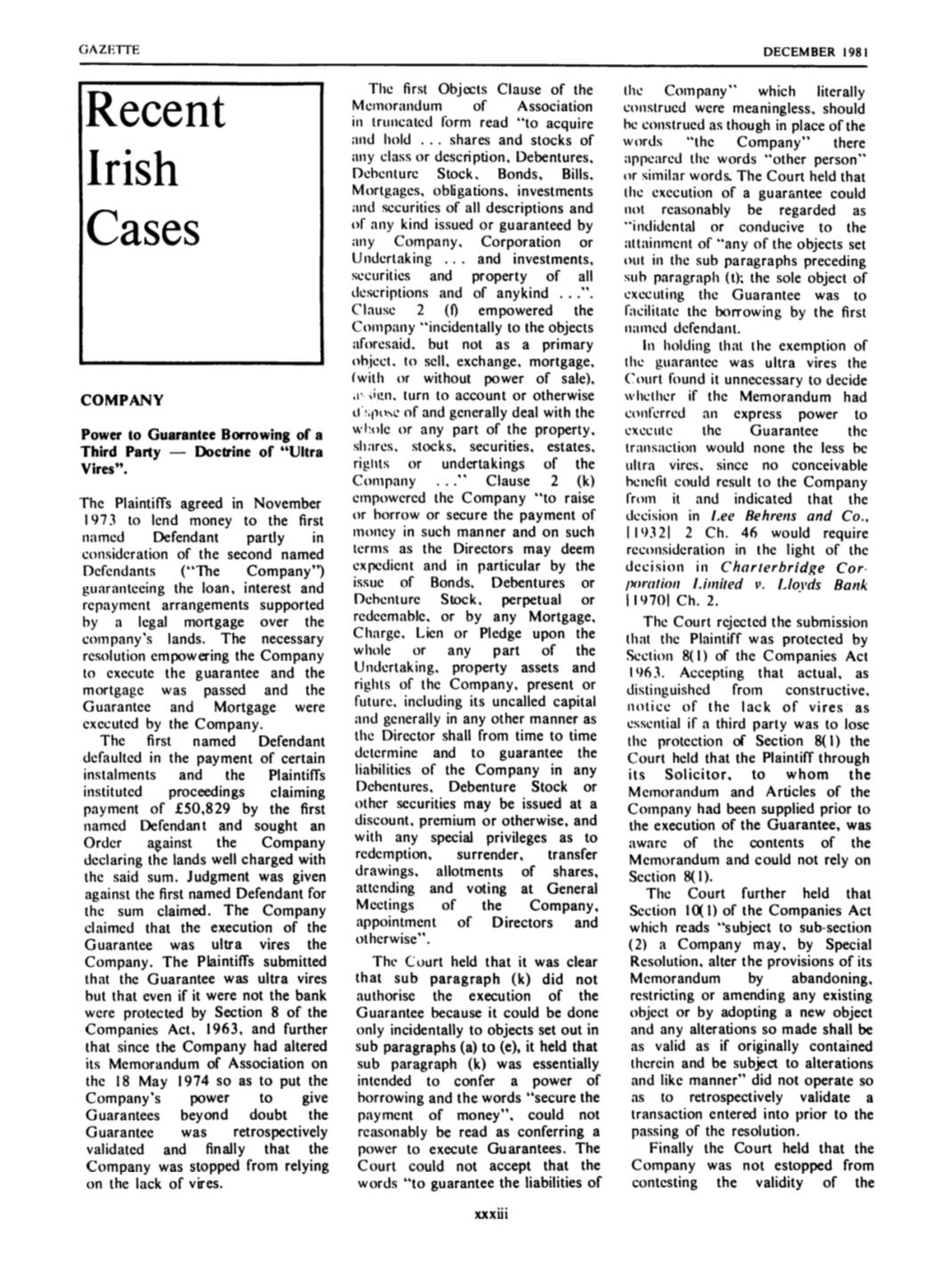

GAZETTE
DECEMBER 1981
Recent
Irish
Cases
COMPANY
Power to Guarantee Borrowing of a
Third Party — Doctrine of "Ultra
Vires".
The Plaintiffs agreed in November
1973 to lend money to the first
named
Defendant
partly
in
consideration of the second named
Defendants
("The
Company")
guaranteeing the loan, interest and
repayment arrangements supported
by a legal mortgage over the
company's lands. The necessary
resolution empowering the Company
to execute the guarantee and the
mortgage was passed and the
Guarantee and Mortgage were
executed by the Company.
The first named
Defendant
defaulted in the payment of certain
instalments
and
the
Plaintiffs
instituted
proceedings
claiming
payment of £50,829 by the first
named Defendant and sought an
Order
against
the
Company
declaring the lands well charged with
the said sum. Judgment was given
against the first named Defendant for
the sum claimed. The Company
claimed that the execution of the
Guarantee was ultra vires the
Company. The Plaintiffs submitted
that the Guarantee was ultra vires
but that even if it were not the bank
were protected by Section 8 of the
Companies Act, 1963, and further
that since the Company had altered
its Memorandum of Association on
the 18 May 1974 so as to put the
Company's
power
to
give
Guarantees beyond doubt the
Guarantee
was
retrospectively
validated and finally that the
Company was stopped from relying
on the lack of vires.
The first Objects Clause of the
Memorandum
of
Association
in truncated form read "to acquire
and hold . . . shares and stocks of
any class or description, Debentures,
Debenture Stock, Bonds, Bills,
Mortgages, obligations, investments
and securities of all descriptions and
of any kind issued or guaranteed by
any Company, Corporation or
Undertaking . . . and investments,
securities and property of all
descriptions and of anykind . . .".
Clause
2 (0 empowered the
Company "incidentally to the objects
aforesaid, but not as a primary
object, to sell, exchange, mortgage,
(with or without power of sale),
.i' den, turn to account or otherwise
d'spose of and generally deal with the
whole or any part of the property,
shares, stocks, securities, estates,
rights or undertakings of the
Company . . . " Clause 2 (k)
empowered the Company "to raise
or borrow or secure the payment of
money in such manner and on such
terms as the Directors may deem
expedient and in particular by the
issue of Bonds. Debentures or
Debenture Stock, perpetual or
redeemable, or by any Mortgage,
Charge, Lien or Pledge upon the
whole
or any
part
of the
Undertaking, property assets and
rights of the Company, present or
future, including its uncalled capital
and generally in any other manner as
the Director shall from time to time
determine and to guarantee the
liabilities of the Company in any
Debentures, Debenture Stock or
other securities may be issued at a
discount, premium or otherwise, and
with any special privileges as to
redemption,
surrender,
transfer
drawings, allotments of shares,
attending and voting at General
Meetings
of
the
Company,
appointment of Directors and
otherwise".
The Court held that it was clear
that sub paragraph (k) did not
authorise the execution of the
Guarantee because it could be done
only incidentally to objects set out in
sub paragraphs (a) to (e), it held that
sub paragraph (k) was essentially
intended to confer a power of
borrowing and the words "secure the
payment of money", could not
reasonably be read as conferring a
power to execute Guarantees. The
Court could not accept that the
words "to guarantee the liabilities of
the Company" which literally
construed were meaningless, should
be construed as though in place of the
words
"the
Company"
there
appeared the words "other person"
or similar words. The Court held that
the execution of a guarantee could
not reasonably be regarded as
"indidcntal or conducive to the
attainment of "any of the objects set
out in the sub paragraphs preceding
sub paragraph (t); the sole object of
executing the Guarantee was to
facilitate the borrowing by the first
named defendant.
In holding that the exemption of
the guarantee was ultra vires the
Court found it unnecessary to decide
whether if the Memorandum had
conferred an express power to
execute
the
Guarantee
the
transaction would none the less be
ultra vires, since no conceivable
benefit could result to the Company
from it and indicated that the
decision in
Lee Behrens and Co.,
I 19321 2 Ch. 46 would require
reconsideration in the light of the
dec ision in
Charterbridge
Cor-
poration
Limited
v. Llovds
Bank
I 1970| Ch. 2.
The Court rejected the submission
that the Plaintiff was protected by
Section 8(1) of the Companies Act
1963. Accepting that actual, as
distinguished
from
constructive,
notice of the lack of vires as
essential if a third party was to lose
the protection of Section 8(1) the
Court held that the Plaintiff through
its Solicitor, to whom the
Memorandum and Articles of the
Company had been supplied prior to
the execution of the Guarantee, was
aware of the contents of the
Memorandum and could not rely on
Section 8(1).
The Court further held that
Section 10(1) of the Companies Act
which reads "subject to sub-section
(2) a Company may, by Special
Resolution, alter the provisions of its
Memorandum
by
abandoning,
restricting or amending any existing
object or by adopting a new object
and any alterations so made shall be
as valid as if originally contained
therein and be subject to alterations
and like manner" did not operate so
as to retrospectively validate a
transaction entered into prior to the
passing of the resolution.
Finally the Court held that the
Company was not estopped from
contesting the validity of the
xxxiii
















